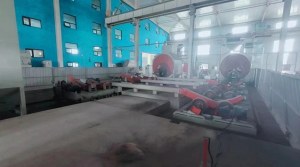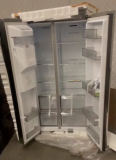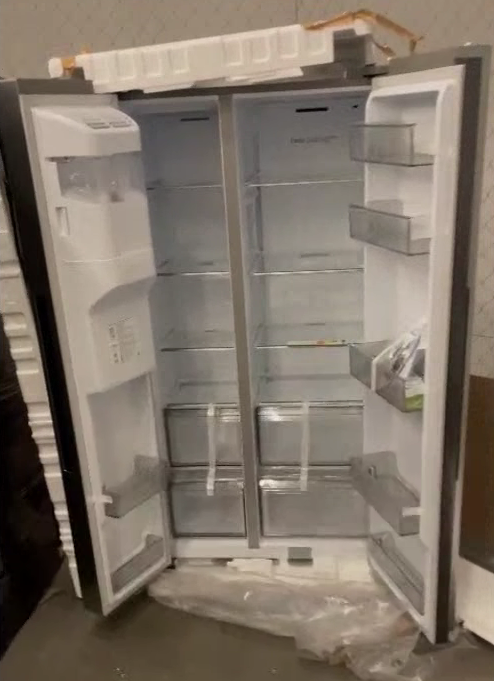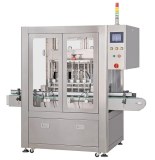An anti-corrosion and insulated internal pipe coating equipment production line is a specialized system used for manufacturing steel that are resistant to corrosion and have insulation properties. This internal pipe coating equipment typically includes equipment such as an uncoiler, forming mill, insulation layerinjection machine, anti-corrosion coating machine, curing oven, and cutting machine. The internal coal tar epoxy pipe coating production line is designed to apply protective coatings and insulation materials to steel , ensuring their durability and thermal efficiency. This coating for underground piping technology is commonly used in industries such as oil and gas, thermal power, and chemical processing, where pipe corrosion and insulation are critical factors.
INTERNAL PIPE COATING EQUIPMENT FOR SALE
3PE Anti-corrosion Steel Pipe Production Line
Plastic Coated Steel Pipe Anti-Corrosion Production Line
Polyethylene (PE) Insulated Steel Pipe Production Line
THE IMPACT OF ANTI-CORROSION AND INSULATION ON STEEL PIPE QUALITY AND DURABILITY
Anti-corrosion and insulation are two essential factors that significantly impact the quality and durability of steel . Corrosion can weaken the structural integrity of steel over time, leading to leaks and failures. Therefore, implementing effective anti-corrosion measures is crucial to extend their lifespan.
Anti-corrosion coatings and treatments create a protective barrier on the outer surface of the , preventing contact between the steel and corrosive environments such as moisture, chemicals, and saltwater. This barrier inhibits the formation of rust and corrosion, thereby enhancing the overall durability of the steel pipe.
Similarly, insulation plays a vital role in maintaining the quality of steel , especially in applications where temperature variations are significant. Insulation helps minimize heat loss or gain, which can affect the structural integrity of the . By preventing thermal stresses, insulation reduces the likelihood of cracking, deformation, and premature failure.
Overall, the implementation of anti-corrosion and insulation measures significantly enhances the quality and durability of steel , ensuring their longevity and reliable performance in various applications.
THE ROLE OF ANTI-CORROSION AND INSULATED STEEL IN INFRASTRUCTURE DEVELOPMENT
Anti-corrosion and insulated steel play a crucial role in infrastructure development. They are widely used in various sectors such as oil and gas, water distribution, sewage systems, and construction.
One of the main benefits of anti-corrosion coatings on steel is the prevention of corrosion. In infrastructure projects, steel are exposed to harsh environmental conditions, including moisture, chemicals, and saltwater. Without proper protection, corrosion can weaken the over time, leading to leaks, structural failures, and costly repairs. By providing a protective barrier, anti-corrosion coatings extend the lifespan of steel , ensuring their reliability and reducing maintenance requirements.
Insulated steel are essential in applications where temperature control is necessary. These are commonly used in industries such as heating, ventilation, and air conditioning (HVAC) systems, where maintaining consistent temperatures is crucial. Insulation reduces heat loss or gain, ensuring efficient energy transfer and minimizing the risk of thermal stresses on the . This, in turn, enhances the overall performance and durability of the infrastructure system.
In summary, the use of anti-corrosion and insulated steel in infrastructure development is vital for ensuring the longevity, reliability, and performance of various systems. These measures contribute to the overall sustainability and efficiency of infrastructure projects, reducing maintenance needs and operating costs in the long term.
HOW ANTI-CORROSION AND INSULATED STEEL PIPE PRODUCTION LINES WORK
Anti-corrosion and insulated steel pipe machine starts with the raw materials. High-quality steel is selected, which is typically low carbon or alloyed steel with excellent corrosion resistance properties.
The first step in production is surface preparation. The steel are thoroughly cleaned to remove any dirt, rust, or mill scale. This is usually done through methods such as shot blasting or pickling.
Anti-corrosion polyurea internal pipe coatings are then applied to the cleaned . There are various coating options available, such as epoxy, polyethylene, or polypropylene. These coatings are typically applied through processes like extrusion, wrapping, or spraying.
Insulation is added to the coated to provide thermal protection. Common insulation materials include foams such as polyurethane or polystyrene, as well as mineral wool or fiberglass insulation. The insulation is usually applied by wrapping or spraying methods.
After the anti-corrosion and insulation processes, the may undergo additional curing or drying stages to ensure the coatings and insulation are properly bonded and set.
Finally, the finished are subject to quality control checks, which may include testing for coating thickness, adhesion, insulation efficiency, and overall product durability.
The completed anti-corrosion and insulated steel are then ready for distribution and use in various infrastructure projects, providing long-lasting, corrosion-resistant, and thermally efficient solutions.
If you want to know more kinds of ss pipe making machine, please visit our website.
Ubicación : South Industrial Development Zone, Yanshan County, Cangzhou City, Hebei Province, 061300 Cangzhou ,
Persona a contactar : txhmachine txhmachine, 0317 6213222











